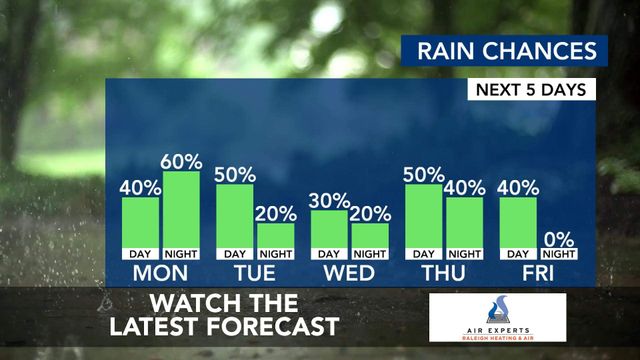2024 hurricane season: What to do when a hurricane is coming

For residents of central and eastern North Carolina, the hot summer months are a perfect time to think about a hurricane preparedness plan.
Plan ahead with simple steps to protect your home and your family, and you won't get flooded with worry the next time a hurricane is headed for the Carolina coast.
This list was put together with helpful advice from WRAL Severe Weather team.
What to do when a hurricane is approaching
Preparing your home for hurricane season is something that should be done annually, at the start of the season. Know whether you’re staying home or evacuating. Have a plan in place for both, if possible. Depending on your location, a hurricane plan should involve specific steps.
When a hurricane is headed your way, consider this checklist:
- Download the WRAL Weather app for the alerts on conditions where you are
- Fill bathtubs with water
- Fill your car's gas tank
- Have supplies packed to go, and be aware of the nearest evacuation route (make sure you have both GPS and a paper map)
- Have enough cash to cover your family for a week
- Have original documentation ready to go (birth certificates, licenses, titles and deeds)
- Have plenty of drinking water and food supplies (one to two weeks worth)
- Know the location of local emergency shelters should you need them
- Make sure all pets have identification tags and are up to date on immunizations
- Protect windows and doors with permanent storm shutters or plywood
- Unplug all small devices and turn off propane/gas tanks
- Store all lawn furniture and outdoor equipment/supplies in a secure location
Have your emergency kit ready
A hurricane preparedness kit can be a large tub designated for supplies or packed in individual backpacks for family members. The following items are recommended supplies to have on hand in the event of a hurricane:
- Antibacterial wipes
- Battery operated radio
- Cash
- Cell phones and chargers
- Cooking and eating utensils
- Disinfectant wipes
- Extra batteries
- Feminine supplies
- Fire extinguisher
- First aid kit and instructions
- Flashlights
- Garbage bags
- GPS
- Household bleach
- Hurricane lamp
- Infant/Toddler supplies (formula, wipes)
- Jumper cables
- Maps
- Non-perishable/canned and pre-packaged foods
- Paper plates, cups and towels
- Pet supplies (food, diaper, drinking water, medications)
- Plastic, five-gallon bucket with tight lid (makeshift toilet)
- Rain gear
- Roadside emergency kit
- Sleeping bags (or warm blankets)
- Sturdy shoes
- Toilet paper
- Waterless soap and hygiene products
- Week-long supply of prescription medicines
Do what you can, start small if necessary, and remember that something is always better than nothing during an emergency.
Know your zone
In the event of a hurricane or tropical storm, it's important to know if you're in an evacuation zone.
Evacuation zones highlight the areas that are most at risk when it comes to storm surge and flooding.
Twenty-one coastal counties have established predetermined evacuation zones. You can find your zone by using the map provided by the North Carolina Department of Public Safety.
Make an insurance binder
To save time, designate a place for all original, important documents. Flood insurance is a must for anyone in a flood zone. Make sure your insurance is up to date and all policy documents are in an easily-accessible place, especially claim phone numbers and instructions.
Take photos and inventory of your personal belongings, especially valuables. Your homeowner’s (or even renter's) insurance should cover everyday items like clothing, electronics and furniture up to a set value amount (refer to your policy to know what this amount is). For electronics, custom furniture, art work and jewelry, take pictures of all items along with the purchase information and store these with your insurance documents. Certain high-end valuables will be easier to claim if all documentation is available.
Go to readync.gov for a complete hurricane guide.
What to do after the storm
Just because the storm is over doesn't mean you're in the clear yet. There are still a few things to keep in mind after the hurricane passes.
- Let friends and loved ones know you're safe.
- Take photos of any property damage. Contact your insurance company for assistance.
- If you evacuated, return after authorities say it's safe to do so.
- Be alert for tornadoes. They can be spawned by hurricanes.
- Avoid contact with floodwaters. They may be contaminated
- Do NOT walk or drive on flooded roads or through floodwaters.
- Watch out for downed or unstable trees, poles and power lines.
- Do not drink tap water until authorities say it is safe.














